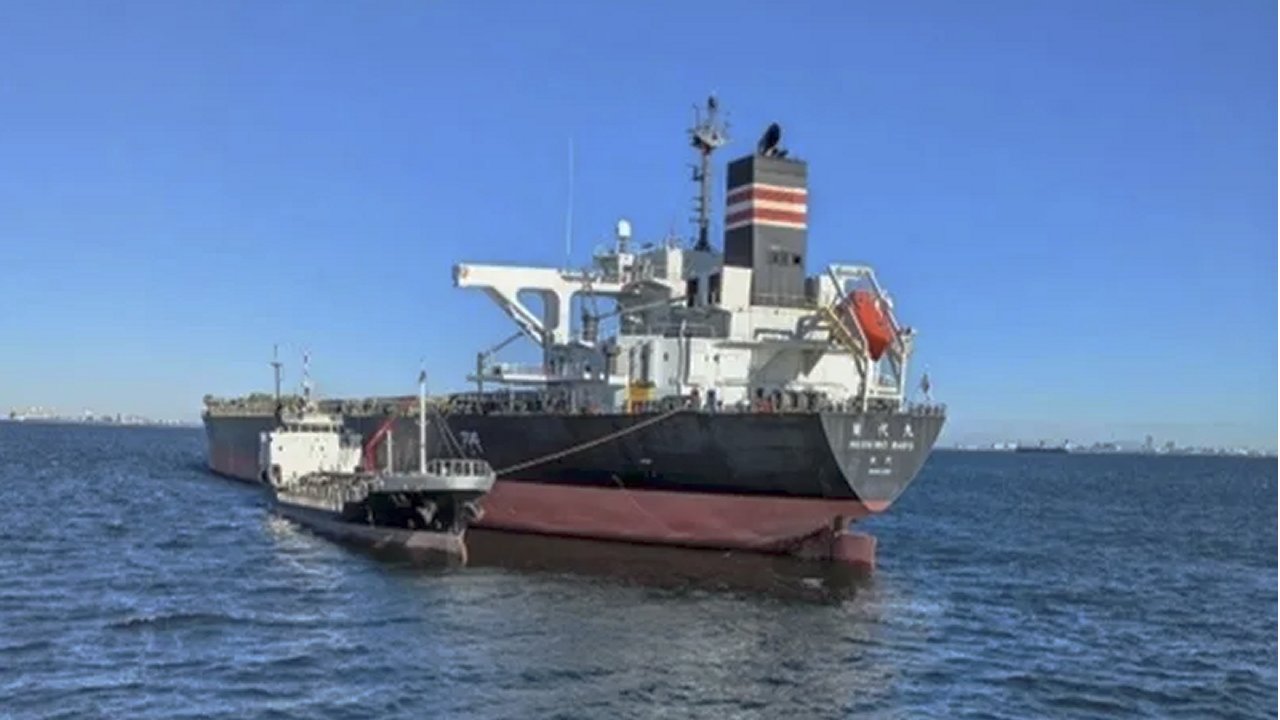
 |
On February 9, NYK Line embarked on a landmark test run involving biofuel on its coal carrier, the Noshiro Maru, which is operated for Tohoku Electric Power. It was the first time in Japan that a coal carrier was used to test biofuel for a domestic utility company.
The delivery of biofuel to the vessel was performed by Mitsubishi Corporation Energy Co., Ltd in the country's Keihin region - an area which covers Tokyo, Kawasaki, and Yokohama.
Biofuels are derived from organic resources, or biomass, such as agricultural residues and waste cooking oil. When combusted, they are considered to produce virtually zero carbon dioxide (CO2) emissions. Their compatibility with heavy-fuel-powered engines — predominant among large merchant vessels — positions biofuels as a pivotal option for reducing greenhouse gas (GHG) emissions during the critical transition from heavy oil to zero-emission fuels.
Moreover, utilising biofuels for navigation purposes plays a role in reducing Scope 3 GHG emissions linked to transporting customers' cargo. NYK has expressed its commitment to promoting decarbonization within marine transport by focusing on integrating biofuels and other next-generation fuels into its operations. The company emphasises that adjusting to biofuels not only aligns with regulatory efforts but also contributes significantly to lowering GHG emissions across customers' entire supply chains.
As the maritime industry faces increasing pressure to reduce its carbon footprint, initiatives like NYK's biofuel test run demonstrate tangible steps toward sustainable practices. Although biofuels emit CO2 during combustion, the lifecycle of these fuels — where plants absorb CO2 while growing — offers a pathway to what is termed carbon neutrality. This aspect makes biofuels a promising alternative to conventional fossil fuels, potentially mitigating the environmental impact of marine transportation.

|
IBIA announces new date for mass flow meter training course in Rotterdam
Training scheduled for 12 May follows mandatory MFM implementation at Rotterdam and Antwerp-Bruges ports. |
|
|
|
||

|
Maersk and Hapag-Lloyd suspend Strait of Hormuz transits amid Middle East security crisis
Container carriers reroute services around the Cape of Good Hope as military conflict escalates. |
|
|
|
||

|
Operations continue as normal at most Middle East ports
Most facilities operating normally, with exceptions in Bahrain, Oman and Saudi Arabia. |
|
|
|
||

|
Naftomar takes delivery of 93,000-cbm dual-fuel ammonia carrier
Gaz Ronin features a MAN dual-fuel engine with high-pressure selective catalytic reduction technology. |
|
|
|
||

|
AYK Energy completes world’s largest marine battery retrofit on Wasaline ferry
Aurora Botnia receives 10.4 MWh battery system, bringing total capacity to 12.6 MWh. |
|
|
|
||

|
Dalian Shipbuilding begins construction on LNG dual-fuel crude tanker
Development is one of a number of milestones reported by parent company over the past few days. |
|
|
|
||

|
Sallaum Lines launches Blue Corridor sustainability initiative for Europe–Africa ro-ro trade
Company deploys LNG-capable vessels with AI routing and eco-speed protocols on new green shipping corridor. |
|
|
|
||

|
Eidesvik Offshore signs yard contract for ammonia retrofit of PSV Viking Energy
Halsnøy Dokk to convert platform supply vessel as part of EU-backed Apollo project. |
|
|
|
||

|
North Sea Port completes risk analysis for alternative fuel bunkering operations
Port authority says LNG, hydrogen, methanol and ammonia can be safely refuelled across its facilities. |
|
|
|
||

|
Ammonia emerges as most feasible alternative fuel for deep-sea shipping in 2050 emissions study
Research combining expert survey and technical analysis ranks ammonia ahead of hydrogen and methanol. |
|
|
|
||
| Petrobras secures ISCC EU RED certification for B24 biofuel blend at Rio Grande [News & Insights] |